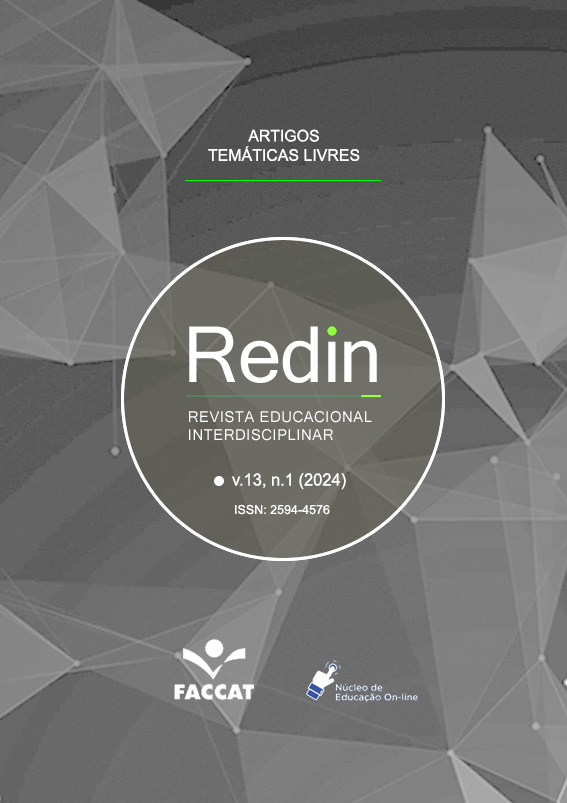The use of digital notebooks to teach programming logic:
a case study with 1st year high school students
Abstract
This work aimed to analyze the use of notebooks, mediated by a Didactic Sequence, in the teaching and learning process of Programming Logic. The target audience was 38 students from the 1st year of the Technical Course in Computer Networks integrated with high school at the Instituto Federal de Educação, Ciência e Tecnologia do Maranhao - Campus Sao Joao dos Patos. This is a qualitative research of applied nature. Regarding the objectives, it has an exploratory character. For data collection, the methods used are observation, photo records, field diary, and questionnaires. The case study took place through a practical workshop using notebooks with sequential and decision structures. With the analysis of the results, it is concluded that the Didactic Sequence is appropriate for the purposes, the use of Jupyter Notebook was satisfactory in the educational process and presents itself as a facilitator in promoting dynamic and interactive learning, where most students agree that the use of notebooks contributed to a collaborative and motivating class.
Keywords: High school; Notebooks; Programming logic.
References
FALKEMBACH, E. Diário de campo: um instrumento de reflexão. In: contexto e Educação, n.7, Juí: Inijuí, 1987.
GARLET, S.; BIGOLIN, N.; SILVEIRA, A.; SIDNEI R. Ensino de Programação de Computadores na Educação Básica: um estudo de caso. Revista Eletrônica de Sistemas de Informação e Gestão Tecnológica, v. 9, n. 2, p. 137, 2018.
GIL, A.C. Métodos e técnicas de pesquisa social. São Paulo: Atlas, 2008.
MARCONI, M.; LAKATOS, E. Fundamentos de metodologia científica. São Paulo: Atlas, 2019.
MARCONI, M.; LAKATOS, E. Fundamentos de metodologia científica. São Paulo: Atlas, 2022.
Neto, T. G. P., & Sousa Filho, R. A. L. Tecnologia educacional: Concepções e desafios na prática de ensino. Research, Society and Development, v. 12, n. 13, p. e77121344157-e77121344157, 2023.
PETRI, G.; VON WANGENHEIM, C.; BORGATTO, A. Evolução de um Modelo de Avaliação de Jogos para o Ensino de Computação. In: XXV WORKSHOP SOBRE EDUCAÇÃO EM COMPUTAÇÃO ARTIGOS, 2017, São Paulo. Anais [...]. São Paulo: Sbc, 2017. p. 2327-2336.
PINHEIRO FILHO, I. S. Educação e Tecnologia: O Uso de Recursos Inovadores no Processo de Ensino-Aprendizagem/Education and Technology: The use of Innovative Resources in the Teaching-Learning Process. ID on line. Revista de psicologia, v. 14, n. 51, p. 1008-1020, 2020.
RUIZ-SARMIENTO, J.; BALTANAS, S.; GONZALEZ-JIMENEZ, J. Jupyter Notebooks in Undergraduate Mobile Robotics Courses: educational tool and case study. Applied Sciences, v. 11, n. 3, p. 917, 2021.
SAMPAIO, T. B. Metodologia da pesquisa [recurso eletrônico]. 1. ed. – Santa Maria, RS: UFSM, CTE, UAB, 2022.
SANTOS, M. A. dos; NASCIMENTO, G. N. L. do. Metodologia científica: a pesquisa como compreensão da realidade. Palmas: Programa de Mestrado em Ciências da Saúde, 2021.
SILVEIRA, D.; CÓRDOVA, F. A pesquisa científica. Porto Alegre: Editora da UFRGS, 2009.
SUÁREZ‐GARCÍA, A.; ALVAREZ, M.; FERNANDEZ GONZALEZ, R.; ARCE, E. Teaching optimization of manufacturing problems via code components of a Jupyter Notebook. Computer Applications in Engineering Education, v. 26, n. 5, p. 1102-1110, 2018.
SUÁREZ‐GARCÍA, A.; ARCE, E; ALVAREZ, M.; FERNÁNDEZ‐GAVILANES, M. Teaching structural analysis theory with Jupyter Notebooks. Computer Applications in Engineering Education, v. 29, n. 5, p. 1257-1266, 2021.
TANG, C. Computer-aided Linear Algebra Course on Jupyter-Python Notebook for Engineering Undergraduates. Journal of Physics, IOP Publishing, 2021. p. 012004.
VENTURA, M. O Estudo de Caso como Modalidade de Pesquisa. Pedagogia Médica, v. 20, n. 5, p. 383-386, 2007.
ZABALA, A. A prática educativa: como ensinar. Porto Alegre: Artmed, 1998.


